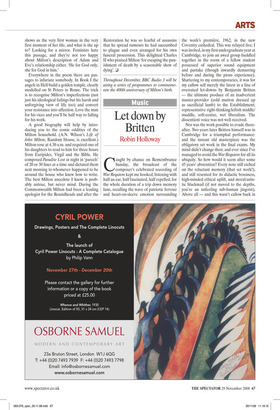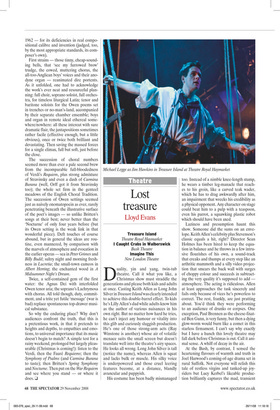Let down by Britten
Robin Holloway
Caught by chance on Remembrance Sunday, the broadcast of the composer’s celebrated recording of War Requiem kept me hooked, listening with half an ear, half fascinated, half repelled, for the whole duration of a trip down memory lane, recalling the wave of patriotic fervour and heart-on-sleeve emotion surrounding the work’s première, 1962, in the new Coventry cathedral. This was relayed live; I was invited, in my first undergraduate year at Cambridge, to join an awed group huddled together in the room of a fellow student possessed of superior sound equipment and partake (though inwardly demurring before and during the pious experience). Shattering to my contemporaries, it was for my callow self merely the latest in a line of overrated let-downs by Benjamin Britten — the ultimate produce of an inadvertent master-provider (cold mutton dressed up as sacrificial lamb) to the Establishment; representative right-thinking/leftish middle/ muddle, soft-centre, wet liberalism. The dissentient voice was not well received.
Nor was the work possible to evade thereafter. Two years later Britten himself was in Cambridge for a triumphal performance: and the instant old masterpiece was the obligatory set work in the final exams. My mind didn’t change then; and ever since I’ve managed to avoid the War Requiem for all its ubiquity. So how would it seem after some 45 years’ abstention? Every note still etched on the reluctant memory (that set work!), and still resented for its didactic bossiness, high-minded ethical uplift, and moral/artistic blackmail (if not moved to the depths, you’re an unfeeling sub-human jingoist). Above all — and this wasn’t callow back in 1962 — for its deficiencies in real compositional calibre and invention (judged, too, by the most appropriate standards, its composer’s own).
First strains — those tinny, cheap-sounding bells, that ‘see my furrowed brow’ trudge, the cowed, muttering chorus, the all-too-Anglican boys’ voices and their anodyne organ — reanimated dire portents. As it unfolded, one had to acknowledge the work’s ever neat and resourceful planning: full choir, soprano soloist, full orchestra, for timeless liturgical Latin; tenor and baritone soloists for the Owen poems set in trenches or no-man’s-land, accompanied by their separate chamber ensemble; boys and organ in remote ideal ethereal somewhere/nowhere: all these intercut with sure dramatic flair, the juxtapositions sometimes rather facile (effective enough, but a little obvious), once or twice both brilliant and devastating. Then saving the massed forces for a single climax, full but soft, just before the close.
The succession of choral numbers seemed more than ever a pale second brew from the incomparable full-bloodedness of Verdi’s Requiem, plus strong admixture of Stravinsky and even a dash of Carmina Burana (well, Orff got it from Stravinsky too); the whole set firm in the genteel meadows of the English Choral Tradition. The succession of Owen settings seemed just as naively onomatopoein as ever, rarely penetrating beneath the illustrative surface of the poet’s images — so unlike Britten’s songs at their best; never better than the ‘Nocturne’ of only four years before (but its Owen setting is the weak link in that wonderful piece). Deft touches of course abound, but in general the ideas are routine, even mannered, by comparison with the marvels of atmosphere and evocation in the earlier operas — sea in Peter Grimes and Billy Budd; sultry night and morning freshness in Lucretia; the small-town cameos in Albert Herring; the enchanted wood in A Midsummer Night’s Dream.
Twice, a self-contained gem of the first water: the Agnus Dei with interfolded Owen tenor aria; the soprano’s Lachrymosa with chorus. All told though, duty, commitment, and a trite yet futile ‘message’ (war is bad) replace spontaneous top-drawer musical substance.
So why the enduring place? Why don’t audiences confront the truth, that this is a pretentious work, in that it pretends to heights and depths, to empathies and emotions, to universal importance that its music doesn’t begin to match? A simple test for a rainy weekend, prolonged but largely pleasurable (Christmas is coming!): listen to the Verdi, then the Fauré Requiems; then the Symphony of Psalms (and Carmina Burana to taste); then Britten’s Spring Symphony and Nocturne. Then put on the War Requiem and see where you stand — or where it does. ❑



































































































 Previous page
Previous page